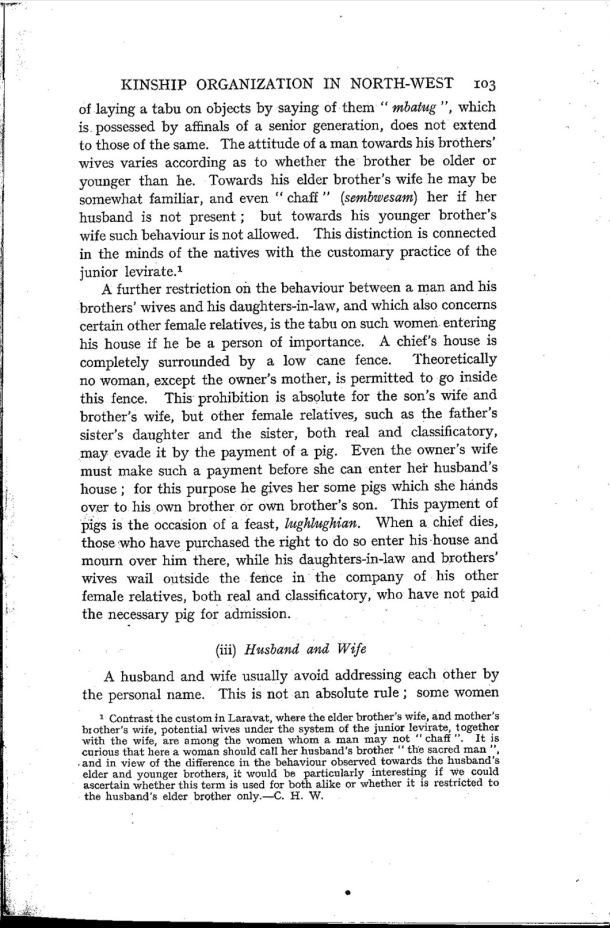|
|  [Note: this transcription was produced by an automatic OCR engine]
KINSHIP ORGANIZATION IN NORTH-WEST 103
of laying a tabu on objects by saying of them “ mbaiug ", which
ispossessed by afï¬Ånals of a senior generation, does not extend
to those of the same. The attitude of a man towards his brothers’
wives varies according as to whether the brother be older or
younger than he. Towards his elder brother’s wife he may be
somewhat familiar, and even " chaff “ (sembwesam) her if her
husband is not present; but towards his younger brother's
wife such behaviour is not allowed. This distinction is connected
in the minds of the natives with the customary practice of the
junior levirate}
A further restriction on the behaviour between a man and his
brothers’ Wives and his daughters-in-law, and which also concerns
certain other female relatives, is the tabu on such women entering
his house if he be a person of importance. A chief's house is
completely surrounded by a low cane fence. Theoretically
no woman, except the owner’s mother, is permitted to go inside
this fence. This prohibition is absolute for the son’s wife and
brother’s wife, but other female relatives, such as the father's
sister's daughter and the sister, both real and classiï¬Åcatory,
may evade it by the payment of a pig. Even the owner's wife
must make such a payment before she can enter her husbands
house ; for this purpose he gives her some pigs which she hands
over to his own brother or own brother’s son. This payment of
pigs is the occasion of a feast, lughlughian. When a chief dies,
those -who have purchased the right to do so enter his -house and
mourn over him there, while his daughters~in-law and brothers‘
wives wail outside the fence in the company of his other
female relatives, both real and classiï¬Åcatory, who have not paid
the necessary pig for admission. ‘
(iii) Husband and Wife
A husband and wife usually avoid addressing each other by
the personal name. This is not an absolute rule ; some women
1 Contrast the custom in Laravat, where the elder brother's wife, and mother's
brother's wife, potential wives under the system of the junior levirate, together
with the wife, are among the women whom a man may not "chaï¬Å ". It is
curious that here a woman should call her husband's brother “ the sacred man ",
-and in view of the diï¬Åerence in the behaviour observed towards the husband's
elder and younger brothers, it would be particularly interesting if we could
ascertain whether this term is used for both alike or whether it is restricted to
the husband's elder brother only.—C. H. W.
|